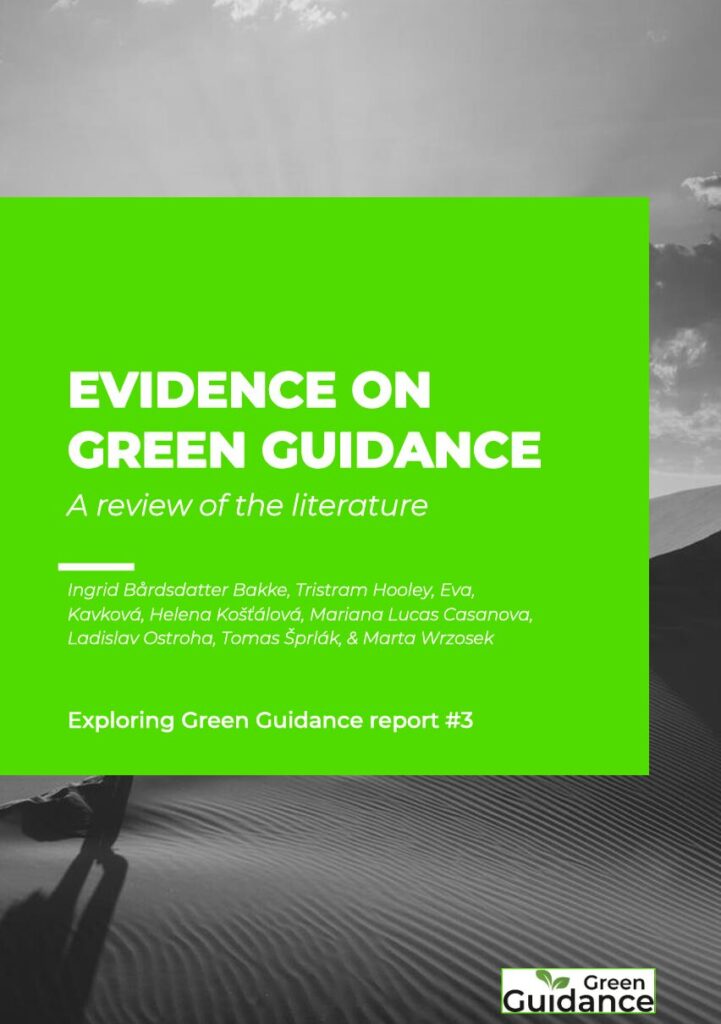Career guidance, sustainability, green issues: evidence from literature

Our partnership published a literature review which examines the intersection between career, career guidance, sustainability, green issues and environmental concerns. The paper is part of the Exploring Green Guidance project, a collaboration among several European partners, focusing on career guidance in the context of environmental sustainability. The work on this paper was lead by Tristram Hooley and Ingrid Bardsdatter Bakke from Inland University of Norway It discusses the real and ongoing effects of climate change on careers, emphasizing the need for ‘green guidance’ to help individuals navigate the greening labor market and address climate anxiety. It identifies three main approaches to green guidance: technocratic, developmental, and emancipatory, each with different strategies for integrating environmental concerns into career development. Based on these findings, a series of recommendations that should be taken into consideration as models for green guidance are developed:
- Green guidance can draw on strong evidence that environmental change is real and ongoing and that its effects are worsening. Given this, it is not a choice as to whether career guidance practitioners engage with it. It will become a part of the world in which people career and in which career guidance is pursued. It is also important to help students and clients engage with this reality, and to recognise that engagement is not the same as behaviour change or meaningful action.
- There is a need to recognise that concern about environmental change and the willingness to act in response to it is bound up with people’s wider identity, including their political and moral beliefs and their beliefs about the environment. Green guidance practice needs to recognise and acknowledge these sensitivities and negotiate them within any intervention. Green issues need to be made relevant to those who do not have a ‘green identity’.
- Careers practitioners need to be able to support clients in dealing with the emotional and psychological issues raised by environmental change. Career guidance practitioners need to understand the psychological implications of environmental change and attend to these issues as they develop approaches to green guidance.
- Green guidance cannot only focus on environmental issues. Models of green guidance also need to be able to address inequalities and social justice issues as well as address the self-interest of individuals. The concept of sustainability and the SDGs may be useful in framing interventions and approaches although it is important to recognise that there are a range of tensions in bringing together environmental, social and economic issues.
- Green guidance needs to be able to draw on green labour market information. Having a clear understanding of labour market realities, how they are impacted by climate change and how net zero policies are likely to stimulate future labour market developments provides a critical underpinning for green guidance. Career guidance practitioners need to be clear about what green jobs are and how individuals can engage in their careers in a green way, even if they are not in a green job. A key element of this needs to be the development of understanding about and capability in the skills that are needed for the green economy.
- Green guidance is not a single approach and so resources need to recognise that there are a range of different ways to ‘do’ green guidance. Green guidance cannot be presented as a single model or approach, but rather as an area of concern to which there are a range of possible answers. In particular the technocratic, developmental and emancipatory traditions provide important ways to think about and organise green guidance responses.
- Green guidance raises a series of ethical questions that practitioners are likely to need help in working through. Historic attachments to ideas like neutrality and impartiality raise issues for practitioners if they are going to encourage active engagement with environmental issues and environmental change.
Download the literature review on this link.